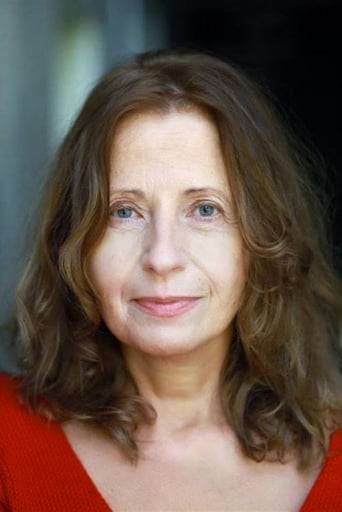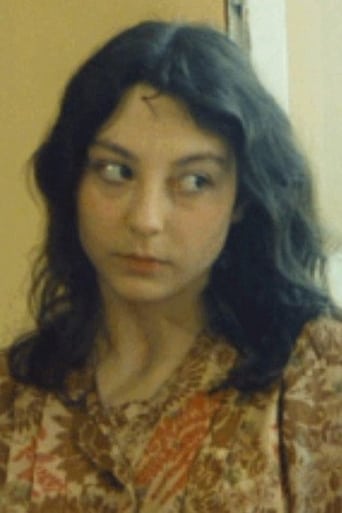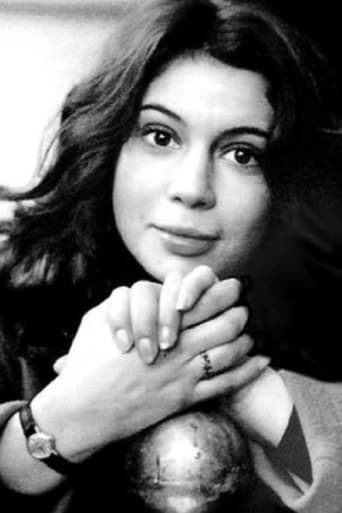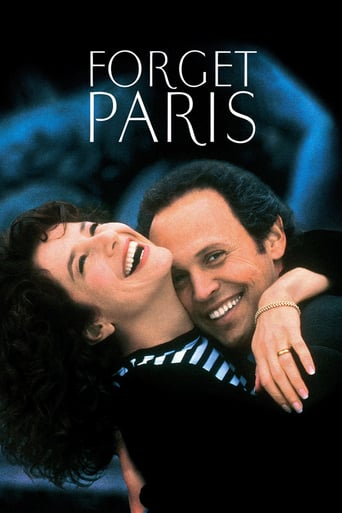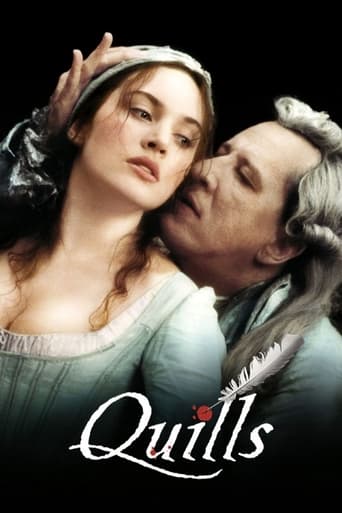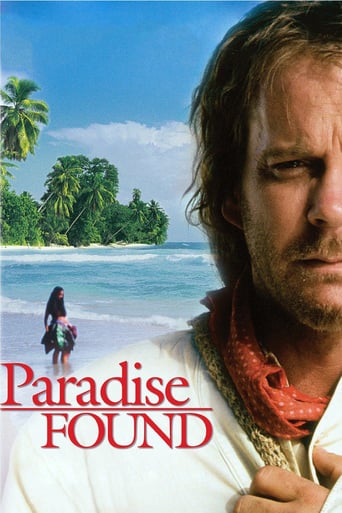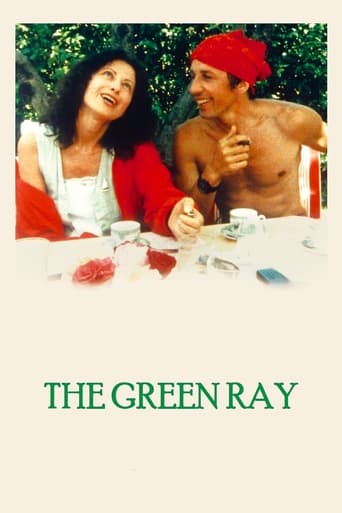
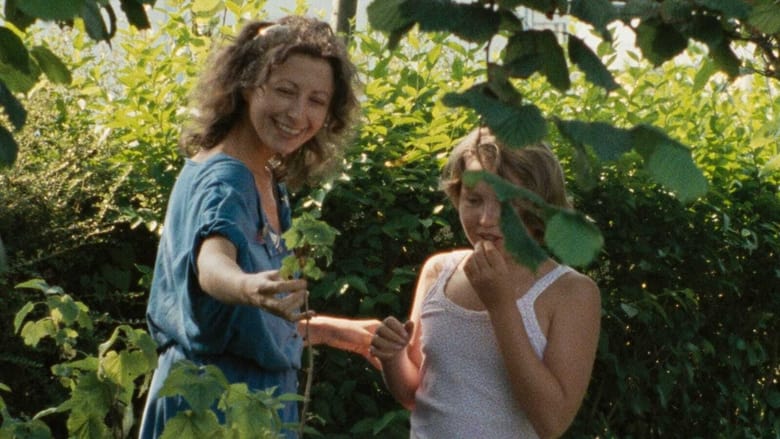
The Green Ray (1986)
A lonely Parisian woman comes to terms with her isolation and anxieties during a long summer vacation.
Watch Trailer
Cast
Similar titles
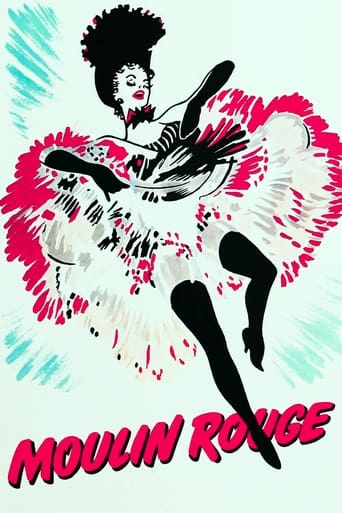
Reviews
A Disappointing Continuation
A Brilliant Conflict
It's the kind of movie you'll want to see a second time with someone who hasn't seen it yet, to remember what it was like to watch it for the first time.
It’s fine. It's literally the definition of a fine movie. You’ve seen it before, you know every beat and outcome before the characters even do. Only question is how much escapism you’re looking for.
Where another of French filmmaker Eric Rohmer's films from the 1980s, 1982's The Good Marriage, was about a young woman addicted to sexual flings attempting to leave her world and attitudes behind so as to seek out something more concrete; his 1986 film The Green Ray covers a woman of equal age, but of a more passive state, trying to discover true love in a more honest form. The film is a pleasant enough little mediation, but both as a stand alone piece and when compared to The Good Marriage, that's all it is; the biting, explosive nature of The Good Marriage's lead and the drama that surrounds her stepping out of a somewhat misandric comfort zone into one of long-term love affairs with all the danger that comes with her mental state, was much more gripping and enthralling. It was braver, starker and was really well directed. The lead here, Marie Rivière's Delphine, carries far less of a personality in this sense; and with that, the film carries less of an edge – less danger and hostility. Gone is the immediacy and yet retained is a sense of a woman on a voyage out to make her own discoveries about the opposite sex and the nature of love, all under Rohmer's style of long takes and the etching out of as much realism and as much authentication from the scenes as possible.Was The Good Marriage's conclusion one of a decidedly bleak nature? It's lead did, after all, appear to happily discover exactly where she appeared to belong in life following something of a diversion or an experiment. The Green Ray's finale is more clear-cut, in that it involves a handsome looking man beside a beach as he observes a somewhat typical and rather Hollywoodised event thus rendering the conclusion more fabricated than we would have liked after so little was driven by instance and causality. Both films see their leads flit from one instance to another, the key difference as to what makes one much more dramatic and involving than the other in that The Green Ray covered a woman attempting to find someone; The Good Marriage was more preoccupied with a woman trying to understand someone. We begin with Delphine at work in a Paris based office, the month July and the weather hot, with her holiday a matter of days away. Tragedy strikes when the boyfriend calls her and cancels their relationship; the holiday still on but a spare space now on show where just a minute ago her man was the occupant. Shell shocked and forlorn, the film will go on to cover Delphine's wondering; stumbling; sprawling and meandering misadventures throughout a number of French locales after a number of suggestions from a number of people; her trip seeing her jump from the large ports of Normany to the cold ski resorts of La Plagne to the baking July beaches of Biarritz.To be involved in the film, you need to be on Delphine's side; the reading of her situation as one of immense misfortune and the noting of her reaction she provides us with as acceptable instead of reading into it as unnecessary moping on a grandeur scale, neigh on essential. The nature and strength of her relationship with her former partner not explored and consequently the full extent unknown, the asking from Rohmer of us to weep for a young woman whom now cannot go off on a summer holiday with a boyfriend and get up to exactly what it is that transpires under those circumstances now in full force. As the film unfolds, Delphine's attitudes will change; her shifting away from desperation linked to her need to find a man so as to take him on holiday like all her friends are doing, thus avoiding going against the status quo, and into a more relaxed and more natural attitude interesting enough to become somewhat absorbed in. It is, after all, only when she begins to cease her earlier attitudes that the right man at the right time comes along.Her journeying to Normandy, Cherbourg in particular, with a friend and her large family sees an attempt at picking up a local seaman go horribly wrong when the authenticity of the man becomes questionable and the danger of just what kind of a person he is suddenly prominent. During her stretch in the Northern region of Normandy, Rohmer will position Delphine in a composition which encompasses a beach in the background as people in groups have fun and enjoy themselves whilst on their holidays; her respective position in the frame in relation to those people, that place and the activities going on systematic of the situation in that she is not participating along with them, despite she would probably doing so had she still been with someone. Instead, more rural walks around fields and farmland by herself that encompass the passing by of a local church is the norm; a day out shot far more intimately as the resonance of the situation and the nature of her holiday and what she does't want settles in.Delphine's journeying sees her shoot all around France, the postcard style and the heavy use of respective pieces of iconography in each region reminiscent of more mainstream pieces although here clashing oddly but effectively with the cinema vérité style and aesthetics Rohmer is applying to his piece. As the film nears its end, Delphine will meet a young Swedish girl whom is additionally travelling alone and enjoys talking and messing with local men that encounter her. Her introduction a confident, topless swagger in the hot sun from seashore to a beach-space beside Delphine, but her attitudes towards the opposite sex ones which effectively scare our lead, even alienating her from these attitudes: a final step in the transition which switches her from seeking out quick, easy substitutions to her predicament and onto a certain train station rendez-vous, rounding off an enjoyable enough piece.
Eric Rohmer has fashioned a film that perfectly mirrors the main character Delphine. It is by turns annoying, insightful and moving. With improvised dialogue the film has a more naturalistic feel than some of Rohmers other work, he also shows more interest in nature than usual making this one of his more interesting films to look at. Delphine, brilliantly played by Marie Riviere, is lonely (and seemingly pining for her ex-fiancé) and her attempts at a vacation form the body of the film. She travels to various places but not until the end does she find something like happiness. She can be very maddening - ignoring people (presumably because they are "not the right sort" - just plain rude to my mind), and lecturing a family on her vegetarianism as they tuck into lamb chops. She does though seem a very real person, and many viewers will find themselves rooting for her anyway - she is like many people we know in being full of faults but you still like them anyway. The greatest weakness of the film is that for all her self-absorption Rohmer does not really provide any evidence of self-insight or change (a serious fault in that drama is all about characters changing), Delphine talks a lot about her problems but her explanations often struck me as trite. An oddity among his output, this should be seen by any Rohmer fan, I would not recommend it as an introduction though. (The mark of 6 may seem low by inflated IMDb standards but it is relative to Rohmers other films).
I liked this film very much, even though the lead character was a real pain in the ass to anyone who was stuck near her.It's not the look of the film, nor most of the acting, that attracts me (although the lead character is done VERY well) - it's the purity of Roehmer's looking at one idea from various angles, exploring it further than we normally do in daily life (unless we are in an intimate relationship with another person), and having the courage to depict it with no sideline curiosities, diversions, or compromising entertainment.It's dubbed, and has a script full to the brim with dialog. Translation: LOTS of subtitle reading. This IS a "discussion" film, and the exchanges are important - however, much of their meaning is hidden in the juxtaposition of words vs actions, facial expressions, body language, etc.. so it's equally visual.I do wish Roehmer used better production qualities. The look of his film takes on something of a rough documentary appearance - which has great potential - but his are without the total spontaneity of a real document OR the total control of all those populating the frame. I.e., "extras" are not controlled well enough to appear unaware of the camera, nor trained enough to act their way through a scene. He needs professional extras.Okay, THAT aside, the CONTENT of the MAIN POINT is so interesting, sad, maddening, and insightful, THIS is why you stick with it. This woman lives in a huge forest of her own, and can't seem to spot a single tree. Everyone can relate to this idea through life's observations - AND direct experience.Face it. NONE of us manage to know the entire forest by our solo strolls along paths of least resistance.
It is not unreasonable to say that Rohmer's films are without par. No director has ever come close to his exquisite and acute observations of the human psyche, and so Rohmer's films are probably only comparable to each other. I find that the more films of his that I watch, the more I am able to see each film clearer. It is no wonder that out of the directors that emerged from the French New Wave, only Rohmer has been able to sustain critical acclaim for his films consistently.Many detractors find fault with his style -- there is little or no music, the plot is only a very very rough skeleton of what actually goes on in his films (as it takes a backseat to exploring the psychology of his characters), there are many moments of silence, and those moments of dialog are mostly ramblings about philosophy, love, and life instead of plot advancement. Well, I find it quite difficult to articulate the charm of his movies too, since he isn't particularly flashy in his writing or his direction.His films are largely introspective, drawing us in to view the character's psyche instead of the events that happen to him, as such his films are always introverted and quiet, where it seems nothing much happens. At first glance, the lead characters of his films seem to be all from the same mold: gloomy, quiet people who are extremely prone to making fickle choices and outbursts of emotion. But the more Rohmer you see, the more likely you'd be to distinguish a pattern among them and their distinctive traits in his characters.They are always caught in a 'limbo' for lack of a better word, usually either caught between two choices that may tear their lives apart or make them better, or caught between two emotions that are pulling them in totally different directions. They are often afraid to take the leap, take the risk in deciding which point of action to make, and thus the films largely comprise of them searching for themselves, their identities, their desires and their wishes. They are as equally clueless about themselves as we are about them initially, and so it is folly to attempt to analyze them at the beginning. And as the film progresses, they learn more about themselves and perhaps we might learn a little more about ourselves too after we have gone through the same emotions and internal struggles with them.That every lead has a distinctive trait is what separates his movies from each other. Each one of them is stuck, and exemplifies the different nuances of our struggles, and so they might all appear gloomy but they vary in their intents and sentiments. In The Green Ray in particular, the lead character is torn between the craving for solitude, and the unbearable loneliness that comes with it. To say I relate to it probably cheapens the film to a certain extent, but it is the best I can say with Rohmer's films. They portray a small corner in our lives that we have been before, that it is impossible to say any less. The fact that he is able to take each corner of our lives (and its accompanying mood) and blow it up on the big screen into a full-length feature film that is neither didactic nor ever fully reassuring, shows the mastery of his craft. Like us, he is unsure and searching, and he portrays that in his films beautifully.All of his oeuvre is definitely worth watching, (save for the god-awful La Collectioneuse, one can only assume that he was going through a shitty state of mind when he was making that pretentious junk), and the best thing about Rohmer is the more films you see of him, the more you see in his films. The reason why I singled out The Green Ray (or Summer on the US DVD), is because of its brilliant lead actress Marie Riviere, which is not only immediately likable, but also painfully personal. Her journey is one that I can slip on comfortably anytime, with an ending that is equally sublime as it is magical. I don't want to spoil it for anyone who is intending to pick this up, but let's just say that it is probably one of the greatest moments of cinema that I have witnessed in my short life. To be able to capture it with such beauty and in such a context, not only offers a respite from the turmoil that we (the lead character and I) have gone through, but also a hope of self-discovery and awareness, makes this gem a great slice of cinema.
